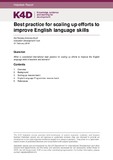| dc.contributor.author | Amonoo-Kuafi, Esi Fenyiwa | |
| dc.coverage.spatial | Algeria | en |
| dc.coverage.spatial | Thailand | en |
| dc.coverage.spatial | Uganda | en |
| dc.coverage.spatial | India | en |
| dc.coverage.spatial | Zambia | en |
| dc.coverage.spatial | Kenya | en |
| dc.coverage.spatial | Liberia | en |
| dc.coverage.spatial | South Sudan | en |
| dc.coverage.spatial | Ethiopia | en |
| dc.coverage.spatial | Bangladesh | en |
| dc.date.accessioned | 2019-04-05T09:27:59Z | |
| dc.date.available | 2019-04-05T09:27:59Z | |
| dc.date.issued | 2019-02-21 | |
| dc.identifier.citation | Amonoo-Kuofi, E. F. (2019). What is considered international best practice for scaling up efforts to improve the English language skills of teachers and learners? K4D Helpdesk Report 521. Brighton, UK: Institute of Development Studies | en |
| dc.identifier.uri | https://opendocs.ids.ac.uk/opendocs/handle/20.500.12413/14444 | |
| dc.description.abstract | This rapid review drew primarily on academic and grey literature published in the last 10 years. Presently, there is a paucity of literature which explores comparable national experiences of implementing large‐scale English language programs and which provide: (i) documentation of the critical components and conditions of the programme designs that affect the likelihood of successfully transitioning from pilot to scale; (ii) review of the design, deployment, and effectiveness of each pilot programme; and (iii) the scale, design, duration, enabling conditions, and initial effectiveness results of the scaled language programmes. The most insightful case study from which there are several recommendations for future language programmes was that of the English in Action (EIA) programme in Bangladesh. Many of the recommendations from this study are listed above and expanded upon in Section 4 of this report. This report is organised into six sections. Section 1 provided an overview of the report findings; Section 2 seeks to give a brief review of some of the background literature on language acquisition and language practice; Section 3 then considers scaling up of national programmes – firstly with an overview of the main lessons regarding scaling up, then looking at lessons learnt for scaling up education programmes more generally; Section 4 focus is on lessons specifically learnt from English language programmes; Section 5 provides the full list of references used. | en |
| dc.language.iso | en | en |
| dc.publisher | IDS | en |
| dc.relation.ispartofseries | K4D Helpdesk Report;521 | |
| dc.rights.uri | https://www.nationalarchives.gov.uk/doc/open-government-licence/version/3/ | en |
| dc.subject | Children and Youth | en |
| dc.subject | Education | en |
| dc.subject | Social Protection | en |
| dc.title | Best Practice for Scaling Up Efforts to Improve English Language Skills | en |
| dc.type | Helpdesk | en |
| dc.rights.holder | © DFID - Crown copyright 2019 | en |
| dcterms.dateAccepted | 2019-02-21 | |
| rioxxterms.funder | Department for International Development, UK Government | en |
| rioxxterms.identifier.project | K4D | en |
| rioxxterms.version | VoR | en |
| rioxxterms.funder.project | 238a9fa4-fe4a-4380-996b-995f33607ba0 | en |

